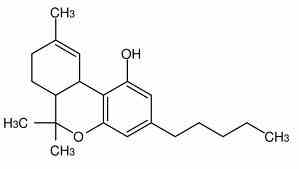6/21/2011 by Jahan Marcu – Since 2001, Dr. Kirsten Muller-Vahl and colleagues have published research articles demonstrating the safety of Delta9-THC in patients with Tourette’s Syndrome. This is a disease characterized by involuntary movement and vocalizations (a.k.a. tics). In 2003, the authors showed that, “Delta9-THC causes neither acute nor long-term cognitive deficits” in patients suffering from Tourette’s.
Recently this group of clinical researchers published a Letter to the Editor of Psychiatry Research outlining their findings in a Tourette’s patient given 15mg of delta9-THC per day. The authors measured the patient’s driving ability with a computerized test and compared it to the patients performance with and without delta9-THC. The author’s state, “In comparison with the drug-free phase (of the treatment), there was a clear improvement in concentration and visual perception during THC therapy.”
The patient, a 42 year old truck driver referred to as Mr.H, first displayed symptoms of this disease at age 6. When he appeared at the clinic for this study he was suffering from multiple tics of the head, arm and leg: Not good symptoms to have for a truck driver. Furthermore, Mr.H’s medical history showed that all available drug treatments were ineffective including dopamine blocking agents, alpha-2 drugs, clonazepam, and terabenazine. Within 2 weeks of delta9-THC treatment Mr.H’s symptoms were reduced by 75%.
The authors call for more research on driving ability in patient’s with Tourette’s while they are under the effect of delta9-THC . The authors do not discuss the possibilities of Cannabis or delta9-THC on the driving ability of patients with other neurological diseases, such as multiple sclerosis.
It is safe to assume that if you can stop chronic muscle spasms and involuntary jerking motions in a patient then you have made them a better driver. This new patient data comes after the DMV in California changed its policy on Medical Cannabis patients when it was successfully sued by American’s for Safe Access. CA DMV refused to renew the license of a medical cannabis patient, despite a “sparkling clean driving record.”
The implications for these findings adds to the on going argument regarding THC levels in the blood and driving ability. While there is still a great debate on the effects of Cannabis and driving in healthy subjects, it appears that persons suffering neurological disorders may have an improved ability to drive.
Despite the remarkable effects delta9-THC can have on the driving ability in a patient with Tourette’s, don’t expect law enforcement or the DMV to treat medical cannabis patients any differently from recreational users.
 Jahan Marcu is currently investigating the pharmacology of cannabinoid receptors. He was working at the California Pacific Medical Center Research Institute when exciting discoveries were made showing enhanced anti-cancer effects with THC and CBD from the Cannabis plant. The findings were published in the Journal of Molecular Cancer Therapeutics. In 2009 he received the Billy Martin Award from the International Cannabinoid Research Society (ICRS). Jahan is currently the vice-chair the Medical and Scientific Advisory Board at Americans for Safe Access (ASA). Questions? Contact [email protected]
Jahan Marcu is currently investigating the pharmacology of cannabinoid receptors. He was working at the California Pacific Medical Center Research Institute when exciting discoveries were made showing enhanced anti-cancer effects with THC and CBD from the Cannabis plant. The findings were published in the Journal of Molecular Cancer Therapeutics. In 2009 he received the Billy Martin Award from the International Cannabinoid Research Society (ICRS). Jahan is currently the vice-chair the Medical and Scientific Advisory Board at Americans for Safe Access (ASA). Questions? Contact [email protected]
DISCLAIMER: The views and opinions expressed are those of the author and do not necessarily represent any University, business or affiliates. While the information provided in this blog is from published scientific studies it is not intended to diagnose or treat any disease.
